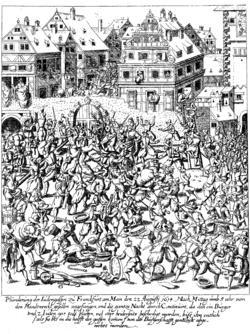
Back Plunder Afrikaans نهب Arabic Talançılıq Azerbaijani Марадзёрства Byelorussian Марадэрства BE-X-OLD Плячкосване Bulgarian Panjarahan BJN Preizhañ Breton Saqueig Catalan Rabování Czech

| Part of a series on |
| War (outline) |
|---|
 |
Looting is the act of stealing, or the taking of goods by force, typically in the midst of a military, political, or other social crisis, such as war,[1] natural disasters (where law and civil enforcement are temporarily ineffective),[2] or rioting.[3] The proceeds of all these activities can be described as booty, loot, plunder, spoils, or pillage.[4][5]
Looting by a victorious army during war has been a common practice throughout recorded history.[6] In the wake of the Napoleonic Wars and particularly after World War II, norms against wartime plunder became widely accepted.[6] In modern armed conflicts, looting is prohibited by international law, and constitutes a war crime.[7][8]
- ^ "Baghdad protests over looting". BBC News. BBC. 2003-04-12. Retrieved 2010-10-22.
- ^ "World: Americas Looting frenzy in quake city". BBC News. 1999-01-28. Retrieved 2010-10-22.
- ^ "Argentine president resigns". BBC News. 2001-12-21. Retrieved 2010-10-22.
- ^ "the definition of looting". Dictionary.com. Retrieved 2016-12-12.
- ^ "Booty – Define Booty at Dictionary.com".
- ^ a b Cite error: The named reference
:0was invoked but never defined (see the help page). - ^ Rule 52. Pillage is prohibited., Customary IHL Database, International Committee of the Red Cross (ICRC)/Cambridge University Press.
- ^ Hague Convention on the Law and Customs of War on Land (Hague II), article 28.